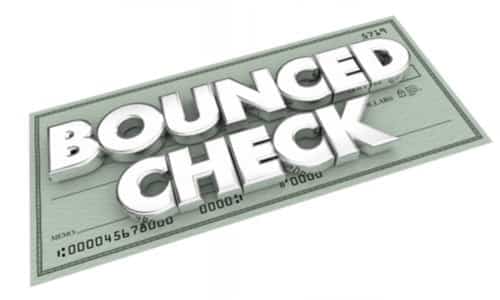
The Non-Criminal Approach to Bounced Checks
By Erik L. Walter – Partner
Nothing is worse than having a customer make a payment for goods or services only to find out that the check issued has insufficient funds and “bounces.”
While there can be criminal consequences for an NSF check, criminal charges do not make a business whole. Neither do the “NSF fees” often charged by businesses for returning an NSF check to its issuer.
Even so, there is hope.
Taking Bounced Check Legal Action in Ohio
The hope mentioned above is a little known and seldom used statute for making a business whole when a “bad check” is issued—ORC § 2307.60. This statute was enacted to hold persons accountable for passing insufficient funds checks where it hurts–the pocketbook.
In particular, ORC 2307.60 allows the recovery of three times the amount of the issued check, administrative costs and attorney fees.
However, certain prerequisites must be followed to obtain these benefits.
Specifically, before a lawsuit is filed, the recipient of the NSF check must give written notice to the offender via certified mail at least 30 days before a lawsuit is filed. This notice must contain specific information or the remedies contained in the statute—recovery of three times the amount of the check, attorney fees and costs–may be lost.
You should have a lawyer help you draft this letter to make sure it is in compliance with the requirements of the statute.
Once this correspondence is sent and you have waited 30 days, you are free to file suit and seek the remedies discussed herein.
3 Tips to Remember When Receiving Checks For Your Business
However, before filing suit, take these tips to heart when dealing with checks being tendered to you:
- Try not to use funds from a check too quickly. While a bank may make funds from a check immediately available, remember that the check still must be sent to the issuer’s bank and may still be dishonored after your bank makes the funds available to you. If this happens, your bank will recall the money it forwarded to you and if you have already used that money, it can lead to fees being charged to you.
- If you receive a check that is dishonored, contact the issuer, in writing, to determine why it bounced. This simple contact may avoid a long legal battle. However, if the issuer fails to respond, you likely have someone who has to be sued to recoup your loss or you may have to let the matter go depending on the amount involved.
- Retain all paperwork and the dishonored check notice you send as it is critical to have a good paper trail in case you have to sue over the check.
Get The Best Advice Regarding Bad Check Laws
If you follow these simple tips, you will be in a better place to recoup the losses stemming from the issuance of an NSF check. This is especially true if the same offender is writing bad checks to others.
However, you must ultimately be mindful of whether or not the offender is collectible because, even if you obtain a judgment for your loss, if the offender is not collectible, the judgment is worthless.
Accordingly, the best advice is to call a lawyer to advise you of the pros and cons of this statutory scheme.
The information presented in this post is not legal advice and does not form a lawyer/client relationship. Laws and circumstances can differ and change.
Please contact us for a personal review of your situation






